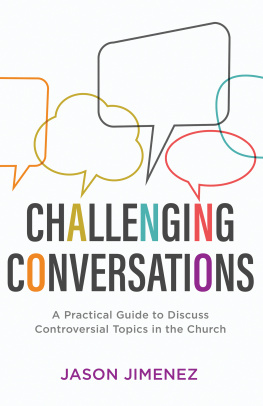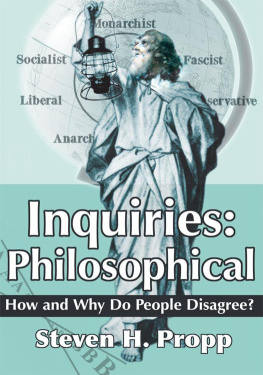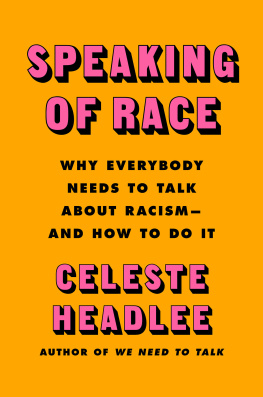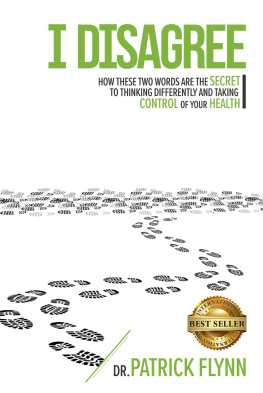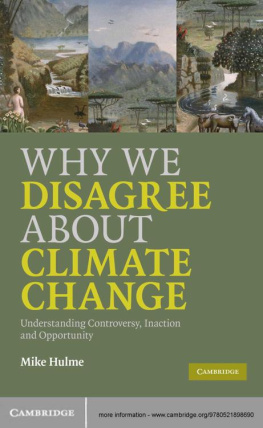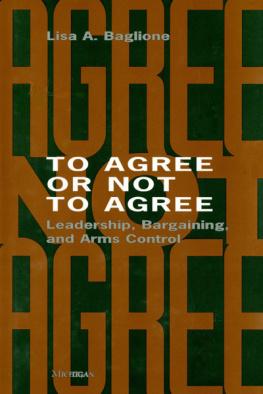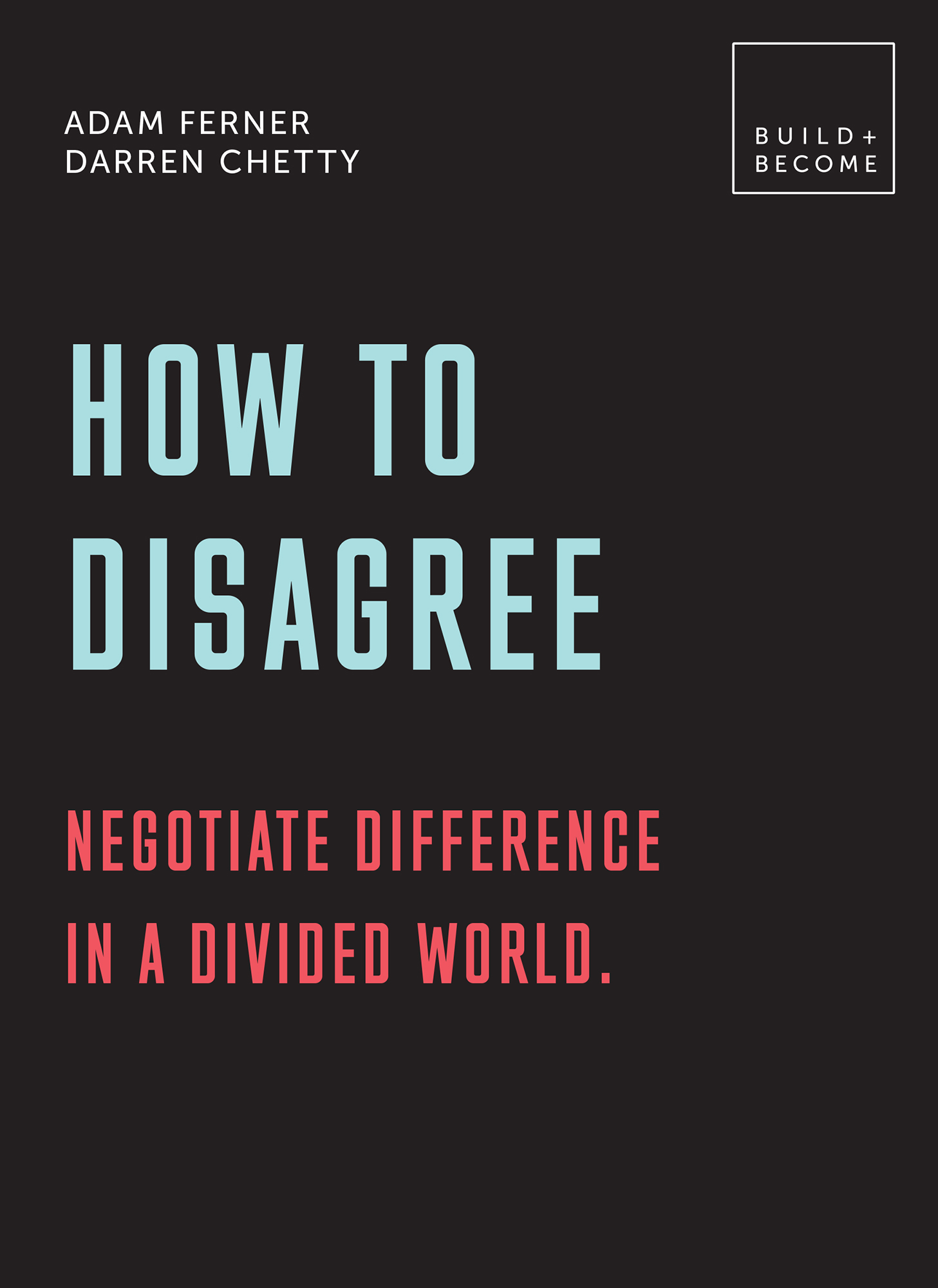HOW TO DISAGREE
NEGOTIATE DIFFERENCE IN A DIVIDED WORLD.
ADAM FERNER & DARREN CHETTY

INTRODUCTION
Disagreements are a fact of life. They can be difficult, messy and deeply uncomfortable but theyre also profoundly important. The discomfort that disagreements can provoke isnt always something to be shied away from and the messiness we find is often a reflection of the complex nature of our everyday lives. Disagreements can be awkward they can be exhausting and tough but that doesnt mean we have to avoid them.
This book isnt designed to make disagreements smoother or more palatable, or to dissolve them. Were not going to tell you how to win an argument or outline the neat rhetorical moves for outsmarting and out-styling your opponent. Nor are we going to get into the philosophical nitty-gritty of argumentation, the careful logic by which premises follow one another towards a sound conclusion. And were not going to suggest good manners are the solution either. There are books that encourage you to disagree politely, to doff your cap after every comment and call each other Sir or Madam. When looking at how to disagree, the best tactic is not to pretend that you dont.
The first chapter of the book, Me, Myself and I, looks at who we are. When we converse with others, we typically have an idea of ourselves as discrete rational agents. This concept of a unitary self comes from a very particular tradition and its not one that everyone buys into. We look at critiques of the rational subject, and issues of group agency. Well also delve into debates about the reality (or lack thereof) of free will and the dependability of truth.
The second chapter, Revealing Systems, looks at the frameworks that organize how we interact. Were going to be looking at the ethical puzzles raised by codes of conduct (like good manners) and the notable gaps that exist by design or otherwise in our understanding of the world. Well look at the different ways of engaging with others, through debates and dialogues, and what it means to speak freely.
Chapter three, Understanding Conflict, will examine some of the ways we slip up in conversation and the kind of damage that can result. Using the prism of Euro-American epistemology the branch of philosophy that deals with knowledge well explore how panic functions to bring conversations to a close, and what diversionary tactics are. Well also look at how speaking for others can present problems, and when might or might not be an appropriate time for action.
I am totally down with disagreement. I don't like Haterade but disagreement is wonderful. When someone disagrees, we try to reach common ground. That's good.
Roxane Gay
In , Reaching Out, well look at methods for building bridges. How do we express solidarity with others, and whats the value in doing so? Meal-sharing or inter-dining is a particularly interesting way of reaching out and as well see in the section on humour, jokes can play a central role in bringing people together too.
The final chapter is called Moving Forward. All too often, conversations get stuck in ruts; the idea in this part is to examine four different topics veganism, climate change, euthanasia and white supremacy as they are embedded in the real world, and to explore strategies for opening them up and shifting them onto different registers; though the final section, Self-Care, looks at the importance of knowing when to pause and when to stop completely.
This book is itself the product of a dialogue (and, sometimes, disagreements). While the words youre reading were largely written by Adam, the thoughts they express emerged from long often exciting, sometimes baffling conversations, which took place over coffee and Oreos in Darrens front room. Weve agreed and disagreed, laughed and scowled about the topics that feature here, and our contents list is a result of deliberation and negotiation with each other and our publishers.
And though we dont necessarily reach any capital-C Conclusions or capital-S Solutions, there is one idea that runs throughout, towards which both of us are profoundly sympathetic: disagreement is essential. Talking, arguing, debating, discussing in the right conditions, these can be incredibly worthwhile activities. They can be even better when theyre enjoyed with different people, from different places, with different points of view. So, whether or not you agree with the thoughts found in this book, we hope at the very least that theyll provide some good topics for conversation
HOW TO USE THIS BOOK
This book is organized into five parts and 20 sections covering the ways we can navigate productive disagreement.

Each section introduces you to an important concept,
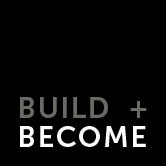
and explains how you can apply what youve learned to everyday life.

As you go through the book, TOOLKITS help you keep track of what youve learned so far.

Specially curated FURTHER LEARNING notes give you a nudge in the right direction for those things that most captured your imagination.
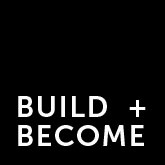
At BUILD+BECOME we believe in building knowledge that helps you navigate your world. So, dip in, take it step-by-step, or digest it all in one go however you choose to read this book, enjoy and get thinking.
PRODUCTIVE DISAGREEMENTS ARE PROFOUNDLY IMPORTANT.
SECTIONS
The idea of a rational subject is socially constructed.
Groups and individuals perform actions in different ways.
Are our political views wholly determined by our upbringing?
The line between true and false isnt always easy to find.
We can disagree and still love each other, unless your disagreement is rooted in my oppression and denial of my humanity and right to exist.
James Baldwin
What kinds of things get into arguments? Argumentative things, sure but more broadly? Things like us. Humans. People. Individuals. In this chapter, were going to focus on metaphysics the area of philosophy that examines the nature of reality. Were going to investigate the metaphysical character of these special entities who get into fights, converse, engage in dialogue and debate. Were going to look at their nature, and how they exist in the world.
For thousands of years, philosophers have been putting forward stories about the kinds of beings we are. Whether they construe us as essentially thinking things or embodied consciousnesses, every story moderates the ways in which we interact with each other. One account, popular since the seventeenth century, holds that we are rational subjects boundaried, self-governing intelligences who are privy to our own thoughts and nobody elses. In section 1, Being Me, were going to examine this seemingly intuitive notion. Are our thoughts really so discrete? There are certainly some situations like the co-authored text youre currently reading which suggest that the reality is more complex.


